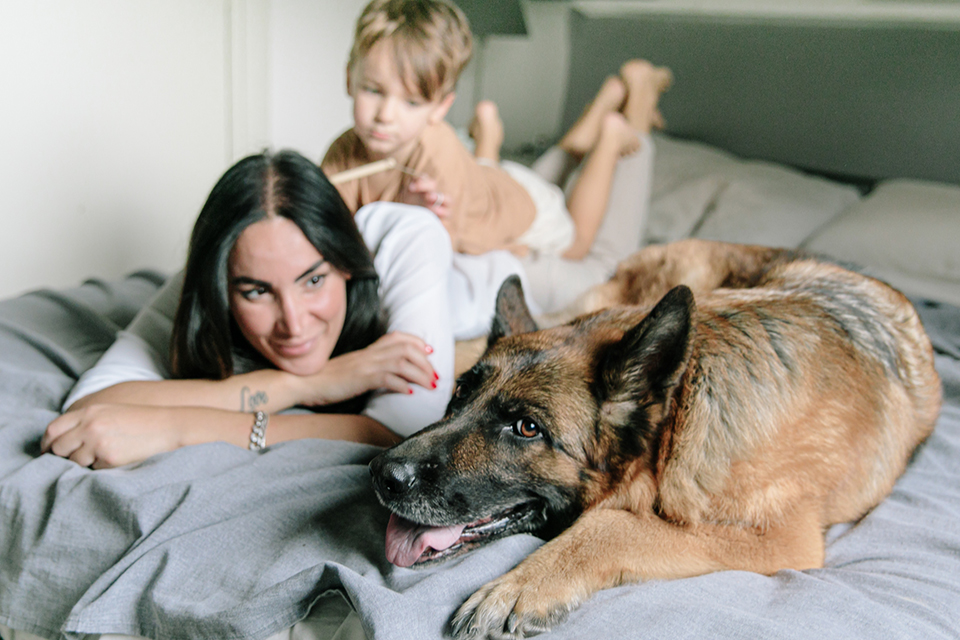What happens to the family dog or other family pets after separation? Dogs, cats and other cherished animals are an integral member of the family. However, the family law system actually addresses pet ownership (or custody) as part of the property settlement process.
So, understanding that “Rufus” is property for distribution, regardless of the circumstances of your separation, only one of three outcomes is possible:
- The parties work out an agreement about who will keep the dog.
- The parties fail to agree, and a court decides who keeps the dog.
- The parties agree to share ‘custody’ of the dog.
Let’s take a closer look.
The parties work out an agreement about who will keep the dog
This is hands down the best option in terms of simplicity. This will ordinarily be a less stressful approach and will minimise family law costs as your matter will not end up in litigation in the Family Court system.
The separated couple work out who will keep the dog and then, if required, transfer ownership to that person, if they are not already the registered owner.
When attempting to work out who should keep the dog, some or all of the following factors may be relevant to the discussion:
- What is in the dog’s best interests?
- Does the dog have a close bond or attachment with one of the parties more so than the other?
- Are there children of the relationship who will live mainly at one household and, if so, would it be positive for the children if the dog were to continue living in that household (takes into account the “child’s best interests” which need to be addressed in any parenting arrangements)?
- Has one of the parties provided the majority of care for the dog (feeding, washing, walking, trips to the vet etc)?
- Who is the current registered owner?
- Who originally purchased the dog?
- Does the dog have any health conditions that may require ongoing treatment? Is one party better positioned to afford associated costs?
- Does one party have a home that is best suited to the dog’s wellbeing, for example with a good backyard, close proximity to beaches, parks or dog parks?
As you can see there are numerous factors that might influence the decision. Once you have an agreement, it is a good idea to make the agreement legally binding. This can be achieved with consent orders or a binding financial agreement, allowing the parties to avoid setting foot in court entirely. Pre-nuptial agreements can also be created before separation which dictate what will become of family pets in the event of a breakdown in the relationship.
Obviously, reaching an agreement can be easier said than done. Around separation it is common for emotions to run high. Separated couples can struggle to agree on the little things like who will keep the box set of Breaking Bad, let alone who will keep the dog.
Approaching property settlement negotiations in ‘good faith’ will help you to minimise conflict and avoid adversarial litigation in court. This will involve:
- a shared commitment to approach negotiations honestly and respectfully;
- making a genuine effort to consider the interests of the other party;
- giving genuine consideration to proposals made by the other party;
- responding to communications from the other party in a timely manner;
- a willingness to compromise and make fair offers;
- taking a reasonable and practical approach to resolving issues;
- not engaging in abusive or antagonistic communication;
- avoiding threats of court action.
The parties fail to agree, and a court decides who keeps the dog
As we’ve said, dogs and other family pets are essentially treated as property under Family Law in Australia. Sounds crazy right? Especially when you consider a dog is a living, breathing animal – hardly in the same category as a fold-out sofa.
While in some countries, legislation is being introduced which deals with pets from the perspective of what is in the best interests of the animal in question; such laws are yet to be seen in Australia.
What this means is that separated de facto or married couples who are unable to come to agreement can seek property orders from the Family Courts dealing with ownership of a dog or other pet. This would almost always occur at the same time as dealing with any other items of property which need to be divided or transferred (homes, vehicles, superannuation etc).
So, in essence, the ownership of the dog will ultimately become one factor out of many to be resolved in your overall property settlement.
How do Courts and lawyers work out how to divide property? They follow a tried and tested four-step process that has evolved over decades of property settlement cases in the Family Courts. This process helps to calculate each party’s range of entitlement in a property settlement.
Property settlement four-step process
Step one – What is in the property pool/asset pool?
Establish what is in the property pool by identifying and valuing the property of the parties, including assets, liabilities and superannuation. This involves making a list of all items and their current values.
Step two – What were the contributions of each party?
Assess the contributions of each party to the property pool. Contributions come in many forms: financial, parenting, homemaker and non-financial contributions.
Step three – What are the future needs of the parties?
Identify the current and future needs of each party (e.g. age, health, income, dependents and other factors). Next, assess whether there should be an adjustment in favour of either party based on those factors.
Step four – Property division proposal
Work out a division of property that is ‘just and equitable’ (a fair distribution of property based on the information gathered in the first 3 steps).
The parties agree to share ‘custody’ of the dog
Imagine sharing your dog with your ex-partner, for example, week-on-week off? Or having ‘access’ to spend time with your dog every other weekend?
As strange as it sounds, these types of agreements do happen. However, is it a good idea?
While this might seem like a win-win at the time, all too often, this type of arrangement has the potential to sour and can result in further stress and conflict down the track.
Common triggers for a breakdown in this type of arrangement include when one of the parties begins a new relationship or if one party refuses to contribute to vet bills. Disagreements about other unrelated issues, for example, child support payments, can result in parties choosing to withhold the dog and cut off contact as a form of payback. Issues may also arise when a party moves to a new house further away or wishes to relocate altogether to a new town or State.
While it is possible for highly amicable and respectful ex-partners to share ownership and custody of a dog, this type of arrangement is not suited to everyone and should be approached with caution.
How can a family lawyer help?
If you would like to discuss your situation in more detail, you can book a free no obligation phone consultation with one of our lawyers. We assist separated couples across Australia with all aspects of separation and family law.
Booking a consultation
📞 Free call us on 1800 357 000
📧 Email us at [email protected]
📅 Select an appointment date and time directly in our calendar










